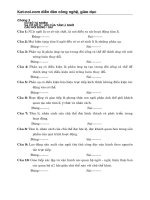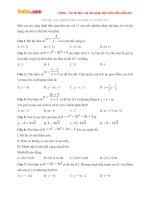Bài tập trắc nghiệm Tiếng Anh lớp 8 có đáp án
Bạn đang xem bản rút gọn của tài liệu. Xem và tải ngay bản đầy đủ của tài liệu tại đây (72.84 KB, 7 trang )
EXERCISES
I. Put the verb in brackets in the Past Simple or Past Perfect:
1. They (go) ……………..home after they (finish) ………………… their work.
2. She said that she (already, see) ……………………. Dr. Rice.
3. After taking a bath, he (go) ………………………….. to bed.
4. He told me he (not/eat) ………………………… such kind of food before.
5. When he came to the stadium, the match (already/begin)
………………………………….
6. Before she (watch) ………………….. TV, she (do)…………………….
homework.
7. What (be) …………….. he when he (be) ………………. young?
8. After they (go) ………………………, I (sit) ……………….. down and (rest)
……………
9. Yesterday, John (go) ………………….. to the store before he (go)
………………… home.
10. She (win) ………………………. the gold medal in 1986.
11. Our teacher (tell) …………….. us yesterday that he (visit) ………………
England in 1970.
12. Alan (have) ………. hardly (prepare)……….. for dinner when her husband
(go)……..home
13. No sooner (have) …………….… I (watch)……………. TV than the phone
(ring)…………
14. Before I (watch) ……………… TV, I (do) ………………………….. my
homework.
15. After I (wash) …………………………….my clothes, I (sleep)
……………………………
16. - “ It is the first time I have eaten sushi” , said Bill.
- Bill said it (be) ……….. the first time he (eat) ……………….. sushi.
1
17.
– “ I broke my glasses yesterday”, said Lan.
- Lan said that she (break) …………………………………… her glasses the
day before.
18. I couldn’t attend the evening classes because I worked at night.
If I (not work) ………………….. at night, I (attend) ………………….. the
evening classes.
19. I didn’t have a laptop so I wish I (have) ………………………. a laptop.
20. You didn’t stay home. I would rather you (stay) …………….. home.
II. Put the verb in brackets in the Past simple, Past perfect or Present perfect.
She didn’t notice that she (never see) …………………….……… that film
before.
2. I suddenly (remember) that I ………………………. (forget) my keys.
3. Bill no longer has his car. He (sell) …………………….. it.
4. (Have/you/put) ………………………. Off the fire before you (go)
……………… out.
5. I was very pleased to see Mary again. I (not see) …………………….. for a
long time.
6. I thanked her for everything she (do) ………………………………… for
me.
7. When I got to the office, I (realize) ………….. I (forget) ………………. to
lock the door
8. Who is that woman? I (never seen) …………………………..… …… her
before.
9. Tom was not at home when I (arrive)………………. He (just go)
………………… out.
10. She said it (be) ……………….. the first time she (meet) …………………..
such a man.
1.
III. Rewrite the sentences beginning as shown:
1.
David went home before we arrived.
2
When we……………………………………………………………..
After ……………………………………………………………….
2. We had snack then we had a look around the shops.
After……………………………………………………………………
3. The light failed the moment they began work.
They had no sooner
…………………………………………………………………….
No sooner……………………………………………………………
Hardly
…………………………………………………………………………
4. We had never been so happy before.
We were…………………………………………………………………
5. I went to the zoo last year and that was where I saw a real tiger for the first
time.
Before
…………………………………………………………………………
6. I like you didn’t go to the party yesterday.
I’d rather you…………………………………………………………...
7. The man was poor so he could not afford accommodation.
If ………………………………………………………………………
8. My teacher gave me a lot of homework.
I wish…………………………………………………………………
9. He didn’t obey with his parents.
I’d rather he………………………………………………………………..
10. She didn’t take that job in the city because his home was very far from there.
If his home……………………………………………………………...
IV. Put the verbs in P ast simple and Past perfect:
1.
Almost everybody (leave)…………………………. by the time we (arrive)
…………………………..
2.
He (wonder)…………………………. whether he (leave)
…………………………. his wallet at home.
3.
The secretary (not leave)…………………………. until she (finish)
…………………………. her work. The couple scarcely (enter)
…………………………. the house when they (begin)
…………………………. to argue.
3
4.
The teacher (ask)…………………………. the boy why he (not do)
…………………………. his homework.
5.
She already (post)…………………………. the letter when she (realize)
…………………………. she (send)…………………………. it to the
wrong address.
6.
Hardly the car (go)…………………………. a mile when it (have)
…………………………. a flat tyre.
7.
The weather (be)…………………………. far worse than we (expect)
…………………………..
8.
They (be married)…………………………. for five years when thy finally
(have)…………………………. a child.
9.
No sooner they (sell)…………………………. their car than they (regret)
…………………………. having done so.
10.
When she (finish)…………………………. her work she (go)
…………………………. to the cinema.
11.
He (not eat)…………………………. until his parents (come)
…………………………. home.
12.
She (tell)…………………………. she never (meet)
…………………………. him.
13.
He (do)…………………………. her homework before he ( go)
…………………………. out.
14.
The lights (go)…………………………. out the moment he (get)
…………………………. into the cinema.
15.
Hardly the holiday (begin)…………………………. when they (leave)
…………………………. the town.
16.
They (be)…………………………. out for an hour when it (start)
…………………………. to rain.
17.
They (leave)…………………………. the shop as soon as they (buy)
…………………………. everything they (need)…………………………..
18.
The house (burn)…………………………. to the ground buy the time the
firemen (arrive)…………………………..
4
19.
As he (do)…………………………. a lot of work that day he (be)
…………………………. very tired.
20.
I already (hear)…………………………. about the accident when he (tell)
…………………………. me about it.
21.
He (live)…………………………. in the country for ten years when he first
(come)…………………………. to London.
22.
I (not talk)…………………………. to him because when I (arrive)
…………………………. he already (leave)…………………………..
23.
When we (go)…………………………. out again, the wind (stop)
…………………………..
24.
He (think)…………………………. he (win)…………………………. in the
lottery but he (not have)…………………………. of course.
25.
No sooner the bell (ring)…………………………. when the pupils (go)
…………………………. out to play.
26.
Before you (mention)…………………………. his name, I never (hear)
…………………………. of this poet.
27.
Our guests (be)…………………………. still here when he (come)
…………………………. back from school.
28.
The same day he (arrive)…………………………. I (receive)
…………………………. a postcard from him.
29.
They just (close)…………………………. the shop when I (get)
…………………………. there.
30.
When the policeman (blow)…………………………. his whistle the driver
(stop)…………………………. the car.
5
6
7









